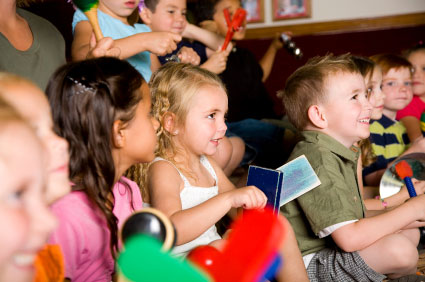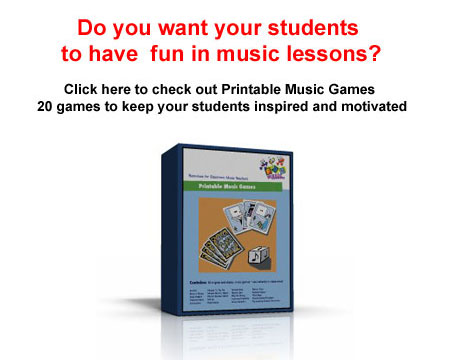I’ve just found a very nice article written by a talented K-8 music teacher, Monica Attel who shares some of here her best tips and tricks with teaching young children.
In the article, she suggests that wearing hats works for her, because it’s a way of providing a gimmick or a comic theme (referred to as a shtick) to help her get the students attention.
She also talks about the importance of playing games with her classes. Here’s what she has to say about it:
“Through these games, I am able to teach musical concepts such as beat, rhythm, facts about composers and the ability to take creative risks. The class gets so engrossed in the game that they hardly know they are learning about music.”
So lets continue this discussion! What are your best ideas and ways to get the attention of your most junior music classes? How do you make it fun?




I think the most important factor is to keep it fun; students definitely respond to that and there’s nothing better than combining fun with learning. The idea about using a hat to catch the kid’s attention is a great idea; kids respond to anything that is out of the ordinary.
The most important thing Keeping Students Engaged in Music.I’m currently working on the f# minor nocturne! they’re beautiful pieces.Don’t get me wrong, you have to be strong and confident to be successful in just about anything you do – but with music, there’s a deeper emotional component to your failures and successes. If you fail a chemistry test, it’s because you either didn’t study enough, or just aren’t that good at chemistry (the latter of which is totally understandable). But if you fail at music, it can say something about your character. It could be because you didn’t practice enough – but, more terrifyingly, it could be because you aren’t resilient enough. Mastering chemistry requires diligence and smarts, but mastering a piano piece requires diligence and smarts, plus creativity, plus the immense capacity to both overcome emotional hurdles, and, simultaneously, to use that emotional component to bring the music alive.
Before I started taking piano, I had always imagined the Conservatory students to have it so good – I mean, for their homework, they get to play guitar, or jam on their saxophone, or sing songs! What fun! Compared to sitting in lab for four hours studying the optical properties of minerals, or discussing Lucretian theories of democracy and politics, I would play piano any day.
But after almost three years of piano at Orpheus Academy, I understand just how naïve this is. Playing music for credit is not “easy” or “fun” or “magical” or “lucky.” Mostly, it’s really freakin’ hard. It requires you to pick apart your piece, play every little segment over and over, dissect it, tinker with it, cry over it, feel completely lame about it, then get over yourself and start practicing again. You have to be precise and diligent, creative and robotic. And then – after all of this – you have to re-discover the emotional beauty in the piece, and use it in your performance.